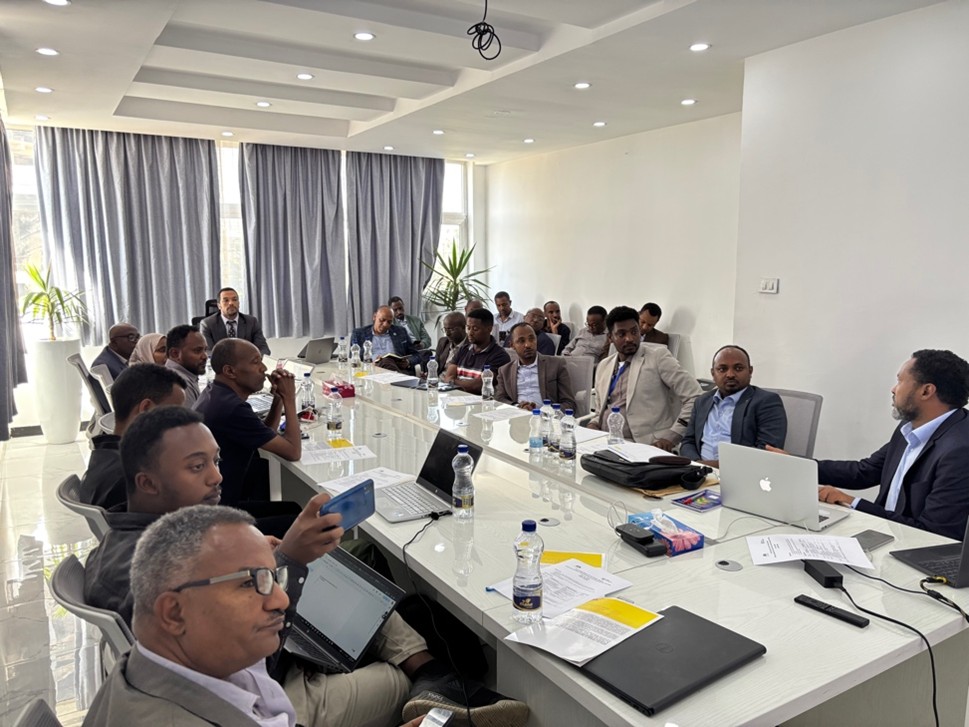On Feb 19, 2025, Vital Strategies achieved a major milestone with the launch of the ENABLE Project’s Clean Air Policy Accelerator, which will support the Ethiopian Ministry of Health with the design and implementation of localized and effective policies to reduce indoor air pollution and its adverse health effects. This project builds on the existing work by ENABLE, a global consortium led by The Ethiopian Public Health Institute and the Norwegian Institute of Public Health to reduce the burden of NCDs in Ethiopia.
The air pollution level in Ethiopia is five times beyond the World Health Organization’s health-based guidelines, killing more than 76,000 people every year; 46% of these are children under 5. Exposure to polluted air during pregnancy results low birth weight, preterm birth and congenital anomalies. Among children, it also causes respiratory symptoms, poor cognitive development and lung function, and death. The use of wood, charcoal and other solid fuels for cooking is one of the largest sources of air pollution in the country: 91.4% of Ethiopian households use solid fuels for cooking.
The launch was attended by H.E. Dr. Dereje Duguma, the State Minister of Health, the Ministry of Health’s lead executive officers, desk heads, and representatives of regional health bureaus. ENABLE project partners from the Ethiopian Public Health Institute and the Norwegian Institute of Public Health also participated in the launch.
The launch provided an opportunity to engage high-level decision-makers to call for the integration of clean air into public health practice, obtain official endorsement from the Ministry of Health, and create a shared understanding of the proposed process to accelerate policies to integrate clean air action into the health system.

Announcing the Clean Air Policy Accelerator
The ENABLE Project co-principal investigator Dr. Masresha Tessema introduced the project’s goal as “reducing the prevalence of lifelong noncommunicable diseases risk factors among pregnant women in cities through multiple actions.”
As part of the policy accelerator process, experts will develop, advocate for and implement high-impact, context- and evidence-based clean air policies that will be integrated into the country’s existing health system. Ethiopia’s existing legal and policy framework provides opportunities for new interventions and a comprehensive approach toward clean air within the primary health care and public health systems.
“Addressing air quality as a risk factor in public health practice involves several key steps,” said Dr. Sumi Mehta, Vice President of Environmental, Climate and Urban Health, Vital Strategies. “These include the better collection and use of relevant data, prioritizing policy solutions, conducting detailed stakeholder mapping, and developing detailed proposals and advocacy plans.”
Commitment to collaboration and next steps
Collaboration across different sectors and within different departments of the Ministry of Health is essential to avoid duplication of efforts and complement resources for effective results. Higher officials at the Ministry of Health expressed their commitment to support the clean air Policy Accelerator process.
“Integrating activities with existing platforms and thoroughly assessing the current scenario is very important to align efforts and addressing the implementation gaps,” said Mr. Israel Ataro, Community Engagement and Primary Healthcare Service Lead Executive Officer at the Ministry of Health.

On Prioritizing Women and Children’s Health
H.E. Dr. Dereje Duguma, the State Minister of Health added, “I think the innovative ENABLE Project is quite important. Our team will closely follow up on the project. I’m very glad to see air quality linked to maternal and child health. The government of Ethiopia always prioritizes maternal health. Mothers are disproportionately exposed to air pollution and its health effects, such as asthma, chronic obstructive pulmonary diseases, and other respiratory diseases due to their household cooking responsibilities. This shows that air pollution is an additional burden for women on the top of maternal mortality.”
“The burden of air pollution and noncommunicable diseases is well established in Ethiopia. We will continue to guide the implementation of the existing documents and implementation of new recommendations from the policy accelerator. Vital Strategies has been working in Ethiopia for many years on policy advocacy and high-level new policy directions, among other things, which has an impact over the whole country. We enjoy this partnership and would like to have a new movement on air pollution and non–communicable diseases,” Dr. Duguma concluded.
Vital Strategies and ENABLE Project
“We thank all of the Ministry and our colleagues in Ethiopia for their shared commitment to cleaner air that will improve health outcomes for thousands of women and children and usher in new policies that will strengthen the public health system for all Ethiopians,” Dr. Mehta concluded.
Vital Strategies are proud partners of the ENABLE Project and will provide technical assistance throughout the Policy Accelerator process.
Photographs thanks to Abraham Sahlemichael.